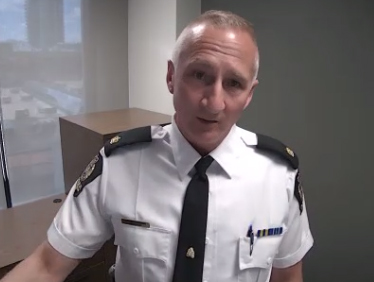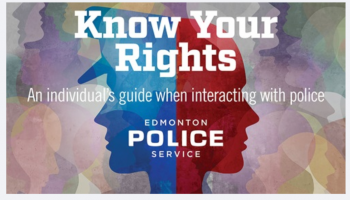Summary
Local Journalism Initiative Reporter
Windspeaker.com
The Edmonton Police Services is hopeful that a new campaign informing the public of their rights during interactions with the police will lead to a respectful relationship.
“At the end of day this is really about helping establish respectful communication between members of the public and police officers, and I think by virtue of understanding what each person is responsible for doing, or cannot do, that assists in having a respectful conversation,” said Insp. Mitchell Flaman of the EPS Equity, Inclusion and Human Rights Branch.

The EPS launched its Know Your Rights campaign on Monday. The goal is to educate the public on what their legal rights are if a police officer stops them on the street for a conversation or for detention.
Flaman stressed during the virtual news conference that this is not new information, but Charter rights that have always existed under the Criminal Code. However, he said, that during Commitment to Action outreach sessions, which the EPS began undertaking with the city’s racialized and underserved populations last September, it became clear that participants wanted to know the rules and responsibilities of police officers.
Flaman also noted that the education campaign is in keeping with Bill 63, introduced by Justice Minister and Solicitor General Kaycee Madu. It ends carding and sets clear rules as to when street checks are to be carried out.
In introducing the legislation in April, Madu said that these changes in police actions were “just one action government is taking to reform policing and combat the legacy of institutional racism that still pervades too many parts of society.”
EPS has created a Know Your Rights pocket brochure with a removable wallet-sized card that can be carried and used during interactions with the police. The wallet card is printed with a QR code that when scanned sends the user to the web page at Know Your Rights (edmontonpolice.ca). The brochure with the removable card can be picked up at the front counter of any of the six divisional stations.
Flaman said there is ongoing discussion as to whether the beat officers will be distributing the wallet cards to those they meet on their foot patrols.
He also noted that his branch is working with language services and treaty organizations to translate the information into a variety of languages.
Flaman stressed that it isn’t only the public that is being educated on the Know Your Rights campaign.
“I think it’s important that officers know what happens externally. We’ve had a campaign internally as well to let officers know what our initiative is on Know Your Rights, why we’re doing it and what the expectation is,” said Flaman.
A “refresher” is reminding officers of the difference between the powers of arrest and detention and that of a non-custodial conversation. If an officer stops someone and initiates a conversation, the individual is under no obligation to speak to the officer and the officer “should be telling the person” that no obligation exists, he added.
“(We are) making sure officers are aware and understand their authorities and obligations during those interactions,” said Flaman.
The campaign will continue with street-level advertising, including high-traffic bus shelters and stores, as well as through social media.
Through this initiative, the EPS says it is “hoping to create transparency, encourage respectful and open dialogue between EPS officers and members of the public and build relationships with individuals who may perceive barriers when interacting with the police.”
Local Journalism Initiative Reporters are supported by a financial contribution made by the Government of Canada.

